Balance Scorecard for Sheffield Surgical Ltd: A Strategic Performance Management Approach
VerifiedAdded on 2019/09/23
|8
|2450
|93
Report
AI Summary
In this assignment, we discuss the importance of implementing a Balanced Scorecard (BSC) in Sheffield Surgical Ltd (SSL). The BSC is a strategic planning and management system that enables organizations to measure performance from four interrelated perspectives: financial, customer, internal processes, and innovation. By introducing the BSC, SSL can align its strategies with stakeholder expectations, improve decision-making, and enhance overall performance. We also review relevant academic literature on the topic, highlighting key trends, accomplishments, gaps, and opportunities for future research.
Contribute Materials
Your contribution can guide someone’s learning journey. Share your
documents today.
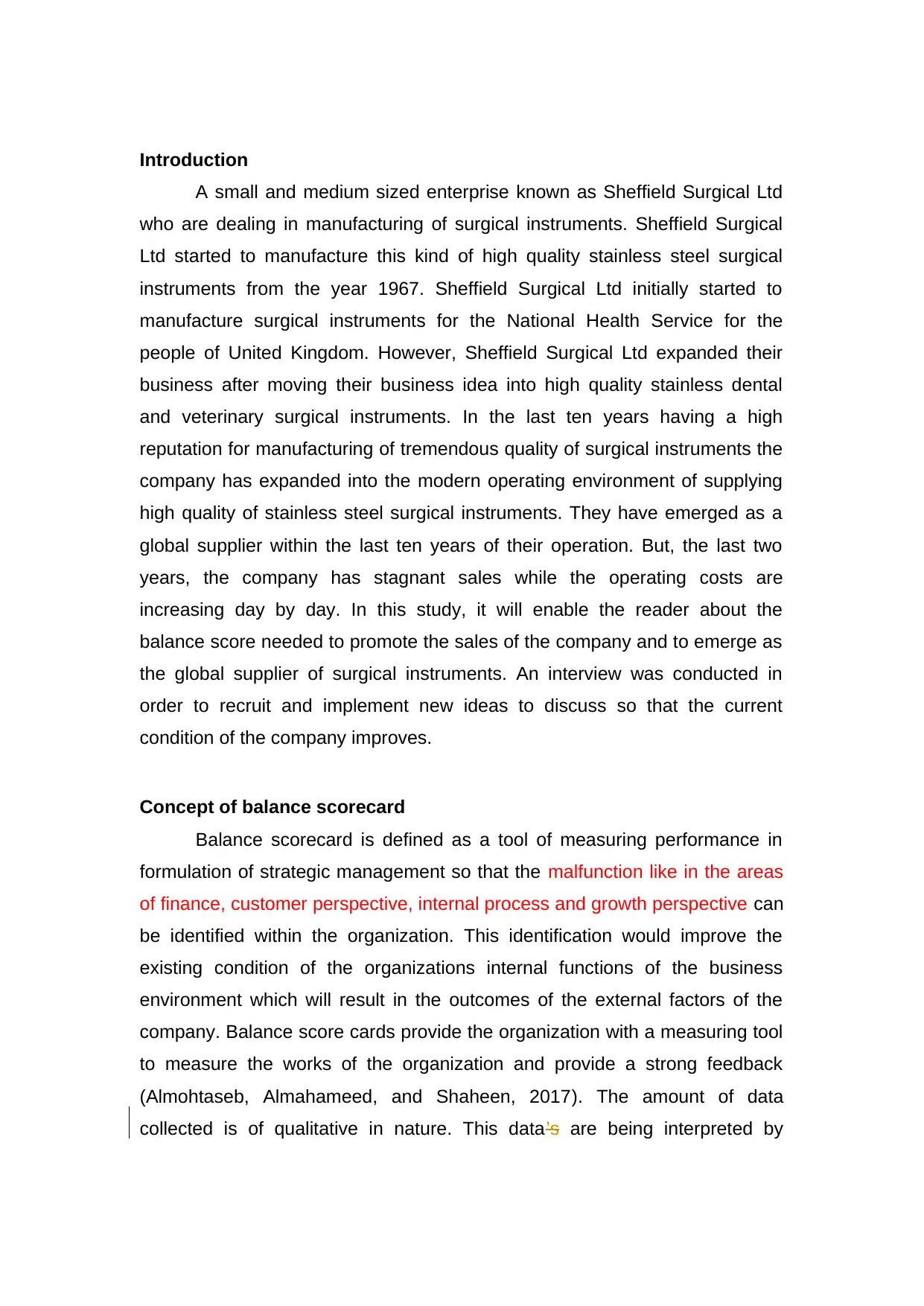
Introduction
A small and medium sized enterprise known as Sheffield Surgical Ltd
who are dealing in manufacturing of surgical instruments. Sheffield Surgical
Ltd started to manufacture this kind of high quality stainless steel surgical
instruments from the year 1967. Sheffield Surgical Ltd initially started to
manufacture surgical instruments for the National Health Service for the
people of United Kingdom. However, Sheffield Surgical Ltd expanded their
business after moving their business idea into high quality stainless dental
and veterinary surgical instruments. In the last ten years having a high
reputation for manufacturing of tremendous quality of surgical instruments the
company has expanded into the modern operating environment of supplying
high quality of stainless steel surgical instruments. They have emerged as a
global supplier within the last ten years of their operation. But, the last two
years, the company has stagnant sales while the operating costs are
increasing day by day. In this study, it will enable the reader about the
balance score needed to promote the sales of the company and to emerge as
the global supplier of surgical instruments. An interview was conducted in
order to recruit and implement new ideas to discuss so that the current
condition of the company improves.
Concept of balance scorecard
Balance scorecard is defined as a tool of measuring performance in
formulation of strategic management so that the malfunction like in the areas
of finance, customer perspective, internal process and growth perspective can
be identified within the organization. This identification would improve the
existing condition of the organizations internal functions of the business
environment which will result in the outcomes of the external factors of the
company. Balance score cards provide the organization with a measuring tool
to measure the works of the organization and provide a strong feedback
(Almohtaseb, Almahameed, and Shaheen, 2017). The amount of data
collected is of qualitative in nature. This data’s are being interpreted by
A small and medium sized enterprise known as Sheffield Surgical Ltd
who are dealing in manufacturing of surgical instruments. Sheffield Surgical
Ltd started to manufacture this kind of high quality stainless steel surgical
instruments from the year 1967. Sheffield Surgical Ltd initially started to
manufacture surgical instruments for the National Health Service for the
people of United Kingdom. However, Sheffield Surgical Ltd expanded their
business after moving their business idea into high quality stainless dental
and veterinary surgical instruments. In the last ten years having a high
reputation for manufacturing of tremendous quality of surgical instruments the
company has expanded into the modern operating environment of supplying
high quality of stainless steel surgical instruments. They have emerged as a
global supplier within the last ten years of their operation. But, the last two
years, the company has stagnant sales while the operating costs are
increasing day by day. In this study, it will enable the reader about the
balance score needed to promote the sales of the company and to emerge as
the global supplier of surgical instruments. An interview was conducted in
order to recruit and implement new ideas to discuss so that the current
condition of the company improves.
Concept of balance scorecard
Balance scorecard is defined as a tool of measuring performance in
formulation of strategic management so that the malfunction like in the areas
of finance, customer perspective, internal process and growth perspective can
be identified within the organization. This identification would improve the
existing condition of the organizations internal functions of the business
environment which will result in the outcomes of the external factors of the
company. Balance score cards provide the organization with a measuring tool
to measure the works of the organization and provide a strong feedback
(Almohtaseb, Almahameed, and Shaheen, 2017). The amount of data
collected is of qualitative in nature. This data’s are being interpreted by
Secure Best Marks with AI Grader
Need help grading? Try our AI Grader for instant feedback on your assignments.
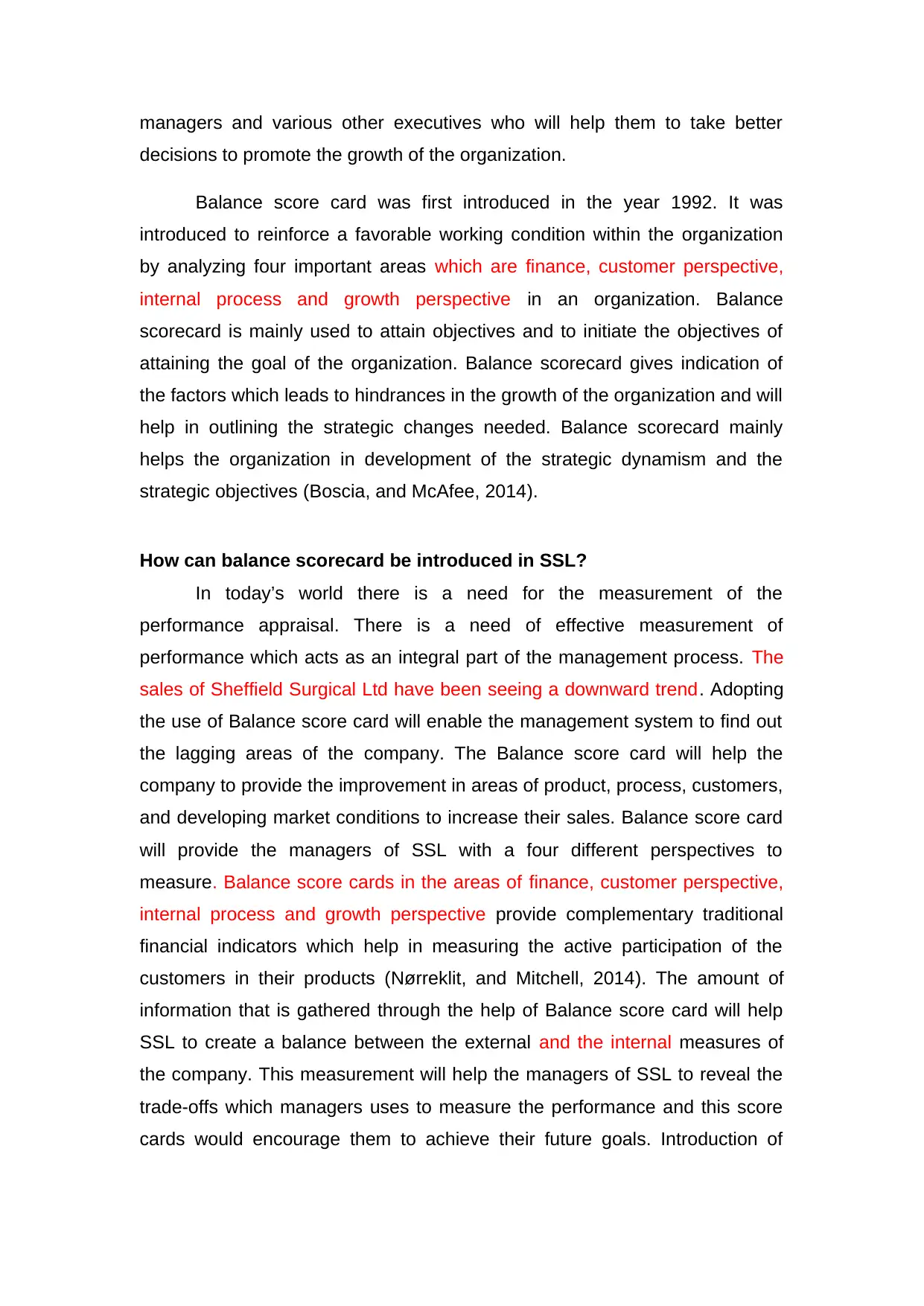
managers and various other executives who will help them to take better
decisions to promote the growth of the organization.
Balance score card was first introduced in the year 1992. It was
introduced to reinforce a favorable working condition within the organization
by analyzing four important areas which are finance, customer perspective,
internal process and growth perspective in an organization. Balance
scorecard is mainly used to attain objectives and to initiate the objectives of
attaining the goal of the organization. Balance scorecard gives indication of
the factors which leads to hindrances in the growth of the organization and will
help in outlining the strategic changes needed. Balance scorecard mainly
helps the organization in development of the strategic dynamism and the
strategic objectives (Boscia, and McAfee, 2014).
How can balance scorecard be introduced in SSL?
In today’s world there is a need for the measurement of the
performance appraisal. There is a need of effective measurement of
performance which acts as an integral part of the management process. The
sales of Sheffield Surgical Ltd have been seeing a downward trend. Adopting
the use of Balance score card will enable the management system to find out
the lagging areas of the company. The Balance score card will help the
company to provide the improvement in areas of product, process, customers,
and developing market conditions to increase their sales. Balance score card
will provide the managers of SSL with a four different perspectives to
measure. Balance score cards in the areas of finance, customer perspective,
internal process and growth perspective provide complementary traditional
financial indicators which help in measuring the active participation of the
customers in their products (Nørreklit, and Mitchell, 2014). The amount of
information that is gathered through the help of Balance score card will help
SSL to create a balance between the external and the internal measures of
the company. This measurement will help the managers of SSL to reveal the
trade-offs which managers uses to measure the performance and this score
cards would encourage them to achieve their future goals. Introduction of
decisions to promote the growth of the organization.
Balance score card was first introduced in the year 1992. It was
introduced to reinforce a favorable working condition within the organization
by analyzing four important areas which are finance, customer perspective,
internal process and growth perspective in an organization. Balance
scorecard is mainly used to attain objectives and to initiate the objectives of
attaining the goal of the organization. Balance scorecard gives indication of
the factors which leads to hindrances in the growth of the organization and will
help in outlining the strategic changes needed. Balance scorecard mainly
helps the organization in development of the strategic dynamism and the
strategic objectives (Boscia, and McAfee, 2014).
How can balance scorecard be introduced in SSL?
In today’s world there is a need for the measurement of the
performance appraisal. There is a need of effective measurement of
performance which acts as an integral part of the management process. The
sales of Sheffield Surgical Ltd have been seeing a downward trend. Adopting
the use of Balance score card will enable the management system to find out
the lagging areas of the company. The Balance score card will help the
company to provide the improvement in areas of product, process, customers,
and developing market conditions to increase their sales. Balance score card
will provide the managers of SSL with a four different perspectives to
measure. Balance score cards in the areas of finance, customer perspective,
internal process and growth perspective provide complementary traditional
financial indicators which help in measuring the active participation of the
customers in their products (Nørreklit, and Mitchell, 2014). The amount of
information that is gathered through the help of Balance score card will help
SSL to create a balance between the external and the internal measures of
the company. This measurement will help the managers of SSL to reveal the
trade-offs which managers uses to measure the performance and this score
cards would encourage them to achieve their future goals. Introduction of
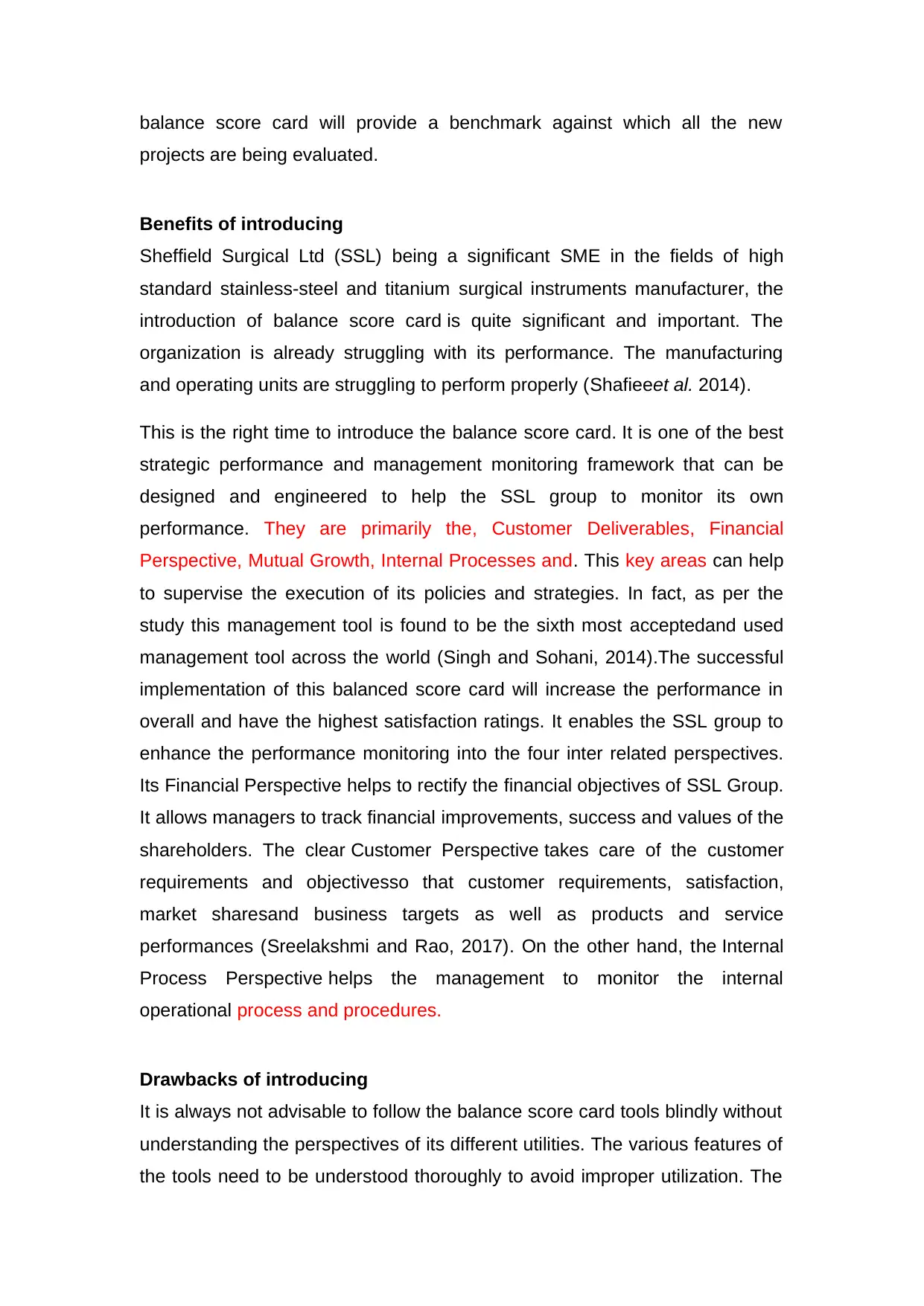
balance score card will provide a benchmark against which all the new
projects are being evaluated.
Benefits of introducing
Sheffield Surgical Ltd (SSL) being a significant SME in the fields of high
standard stainless-steel and titanium surgical instruments manufacturer, the
introduction of balance score card is quite significant and important. The
organization is already struggling with its performance. The manufacturing
and operating units are struggling to perform properly (Shafieeet al. 2014).
This is the right time to introduce the balance score card. It is one of the best
strategic performance and management monitoring framework that can be
designed and engineered to help the SSL group to monitor its own
performance. They are primarily the, Customer Deliverables, Financial
Perspective, Mutual Growth, Internal Processes and. This key areas can help
to supervise the execution of its policies and strategies. In fact, as per the
study this management tool is found to be the sixth most acceptedand used
management tool across the world (Singh and Sohani, 2014).The successful
implementation of this balanced score card will increase the performance in
overall and have the highest satisfaction ratings. It enables the SSL group to
enhance the performance monitoring into the four inter related perspectives.
Its Financial Perspective helps to rectify the financial objectives of SSL Group.
It allows managers to track financial improvements, success and values of the
shareholders. The clear Customer Perspective takes care of the customer
requirements and objectivesso that customer requirements, satisfaction,
market sharesand business targets as well as products and service
performances (Sreelakshmi and Rao, 2017). On the other hand, the Internal
Process Perspective helps the management to monitor the internal
operational process and procedures.
Drawbacks of introducing
It is always not advisable to follow the balance score card tools blindly without
understanding the perspectives of its different utilities. The various features of
the tools need to be understood thoroughly to avoid improper utilization. The
projects are being evaluated.
Benefits of introducing
Sheffield Surgical Ltd (SSL) being a significant SME in the fields of high
standard stainless-steel and titanium surgical instruments manufacturer, the
introduction of balance score card is quite significant and important. The
organization is already struggling with its performance. The manufacturing
and operating units are struggling to perform properly (Shafieeet al. 2014).
This is the right time to introduce the balance score card. It is one of the best
strategic performance and management monitoring framework that can be
designed and engineered to help the SSL group to monitor its own
performance. They are primarily the, Customer Deliverables, Financial
Perspective, Mutual Growth, Internal Processes and. This key areas can help
to supervise the execution of its policies and strategies. In fact, as per the
study this management tool is found to be the sixth most acceptedand used
management tool across the world (Singh and Sohani, 2014).The successful
implementation of this balanced score card will increase the performance in
overall and have the highest satisfaction ratings. It enables the SSL group to
enhance the performance monitoring into the four inter related perspectives.
Its Financial Perspective helps to rectify the financial objectives of SSL Group.
It allows managers to track financial improvements, success and values of the
shareholders. The clear Customer Perspective takes care of the customer
requirements and objectivesso that customer requirements, satisfaction,
market sharesand business targets as well as products and service
performances (Sreelakshmi and Rao, 2017). On the other hand, the Internal
Process Perspective helps the management to monitor the internal
operational process and procedures.
Drawbacks of introducing
It is always not advisable to follow the balance score card tools blindly without
understanding the perspectives of its different utilities. The various features of
the tools need to be understood thoroughly to avoid improper utilization. The
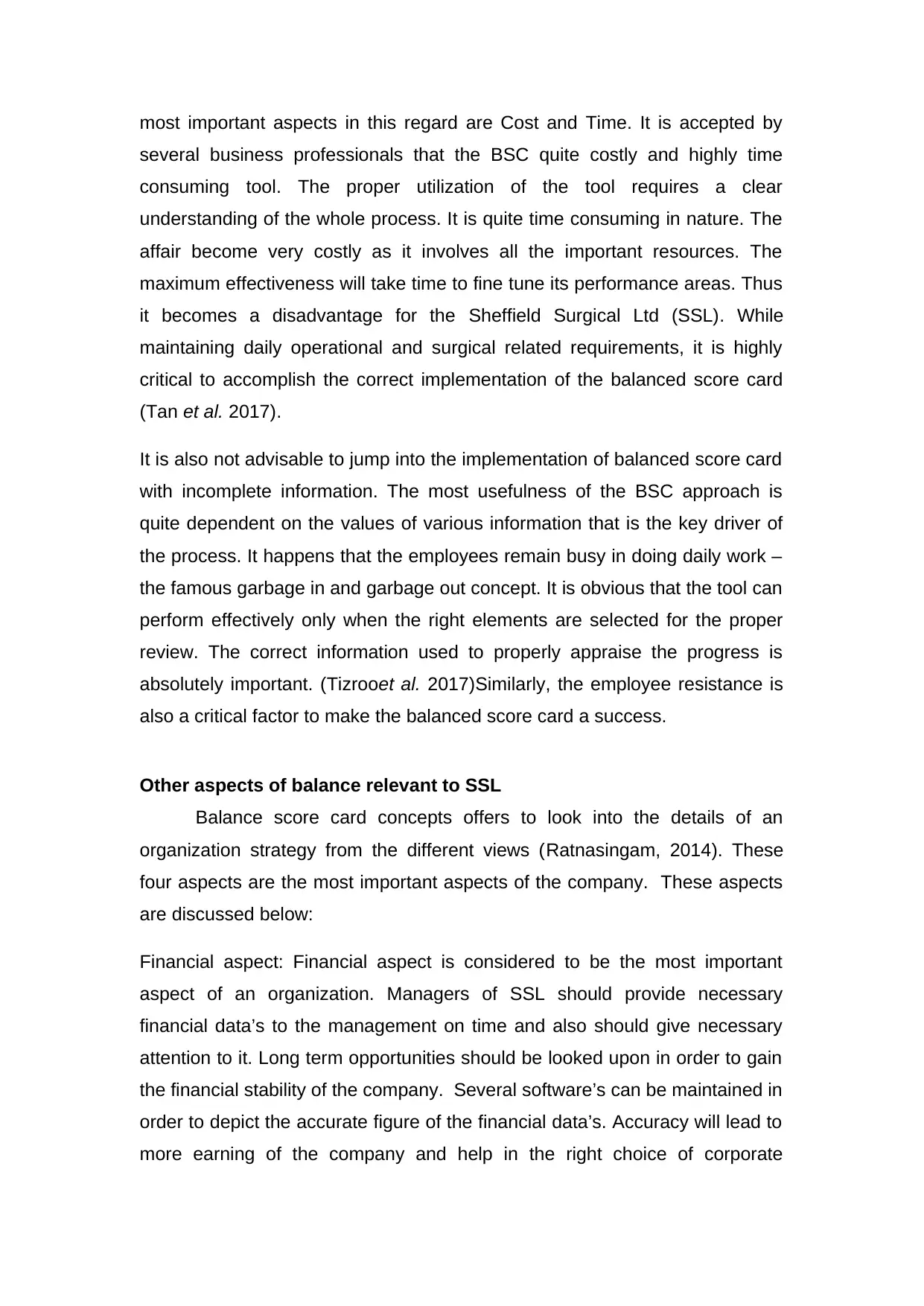
most important aspects in this regard are Cost and Time. It is accepted by
several business professionals that the BSC quite costly and highly time
consuming tool. The proper utilization of the tool requires a clear
understanding of the whole process. It is quite time consuming in nature. The
affair become very costly as it involves all the important resources. The
maximum effectiveness will take time to fine tune its performance areas. Thus
it becomes a disadvantage for the Sheffield Surgical Ltd (SSL). While
maintaining daily operational and surgical related requirements, it is highly
critical to accomplish the correct implementation of the balanced score card
(Tan et al. 2017).
It is also not advisable to jump into the implementation of balanced score card
with incomplete information. The most usefulness of the BSC approach is
quite dependent on the values of various information that is the key driver of
the process. It happens that the employees remain busy in doing daily work –
the famous garbage in and garbage out concept. It is obvious that the tool can
perform effectively only when the right elements are selected for the proper
review. The correct information used to properly appraise the progress is
absolutely important. (Tizrooet al. 2017)Similarly, the employee resistance is
also a critical factor to make the balanced score card a success.
Other aspects of balance relevant to SSL
Balance score card concepts offers to look into the details of an
organization strategy from the different views (Ratnasingam, 2014). These
four aspects are the most important aspects of the company. These aspects
are discussed below:
Financial aspect: Financial aspect is considered to be the most important
aspect of an organization. Managers of SSL should provide necessary
financial data’s to the management on time and also should give necessary
attention to it. Long term opportunities should be looked upon in order to gain
the financial stability of the company. Several software’s can be maintained in
order to depict the accurate figure of the financial data’s. Accuracy will lead to
more earning of the company and help in the right choice of corporate
several business professionals that the BSC quite costly and highly time
consuming tool. The proper utilization of the tool requires a clear
understanding of the whole process. It is quite time consuming in nature. The
affair become very costly as it involves all the important resources. The
maximum effectiveness will take time to fine tune its performance areas. Thus
it becomes a disadvantage for the Sheffield Surgical Ltd (SSL). While
maintaining daily operational and surgical related requirements, it is highly
critical to accomplish the correct implementation of the balanced score card
(Tan et al. 2017).
It is also not advisable to jump into the implementation of balanced score card
with incomplete information. The most usefulness of the BSC approach is
quite dependent on the values of various information that is the key driver of
the process. It happens that the employees remain busy in doing daily work –
the famous garbage in and garbage out concept. It is obvious that the tool can
perform effectively only when the right elements are selected for the proper
review. The correct information used to properly appraise the progress is
absolutely important. (Tizrooet al. 2017)Similarly, the employee resistance is
also a critical factor to make the balanced score card a success.
Other aspects of balance relevant to SSL
Balance score card concepts offers to look into the details of an
organization strategy from the different views (Ratnasingam, 2014). These
four aspects are the most important aspects of the company. These aspects
are discussed below:
Financial aspect: Financial aspect is considered to be the most important
aspect of an organization. Managers of SSL should provide necessary
financial data’s to the management on time and also should give necessary
attention to it. Long term opportunities should be looked upon in order to gain
the financial stability of the company. Several software’s can be maintained in
order to depict the accurate figure of the financial data’s. Accuracy will lead to
more earning of the company and help in the right choice of corporate
Secure Best Marks with AI Grader
Need help grading? Try our AI Grader for instant feedback on your assignments.
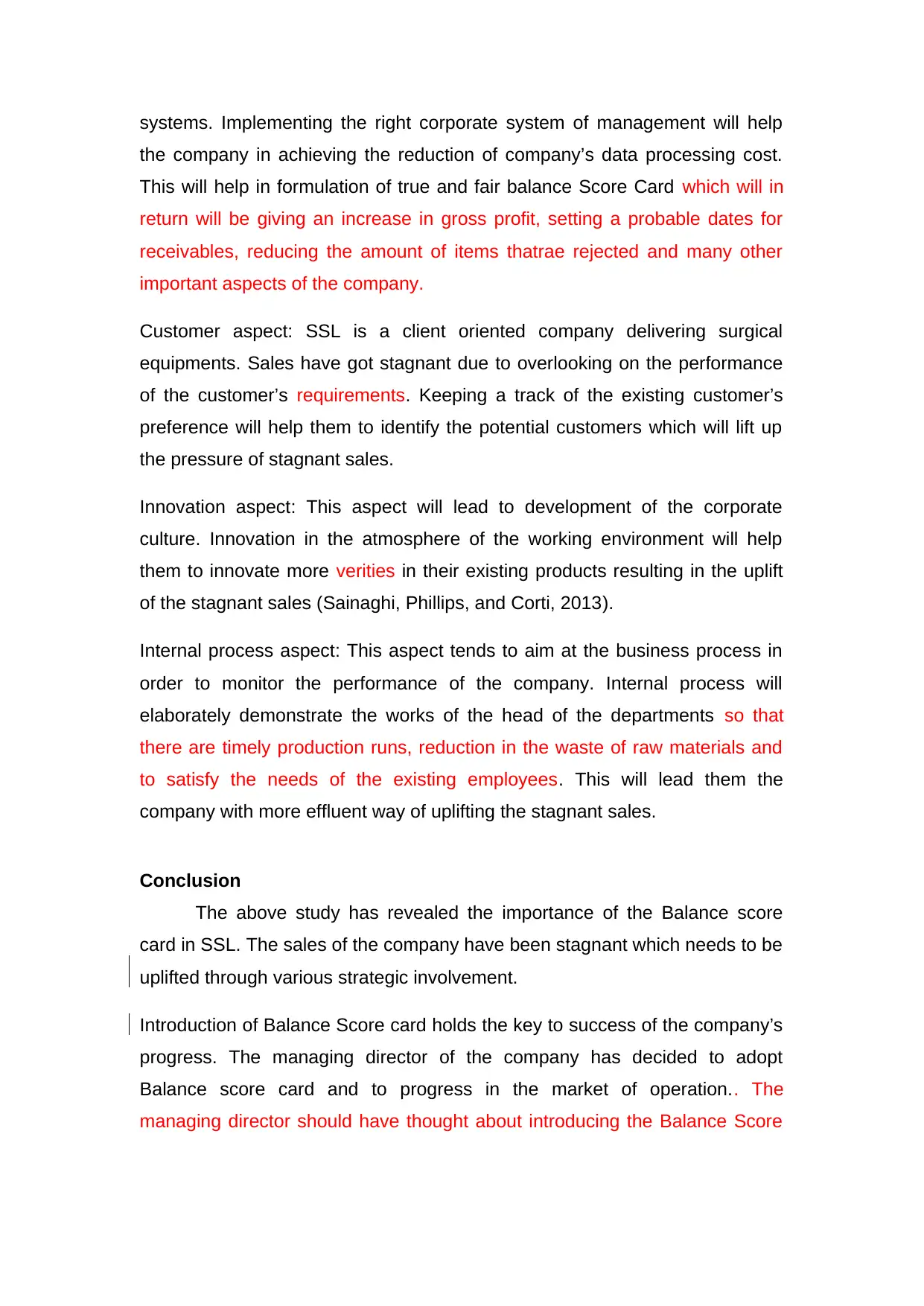
systems. Implementing the right corporate system of management will help
the company in achieving the reduction of company’s data processing cost.
This will help in formulation of true and fair balance Score Card which will in
return will be giving an increase in gross profit, setting a probable dates for
receivables, reducing the amount of items thatrae rejected and many other
important aspects of the company.
Customer aspect: SSL is a client oriented company delivering surgical
equipments. Sales have got stagnant due to overlooking on the performance
of the customer’s requirements. Keeping a track of the existing customer’s
preference will help them to identify the potential customers which will lift up
the pressure of stagnant sales.
Innovation aspect: This aspect will lead to development of the corporate
culture. Innovation in the atmosphere of the working environment will help
them to innovate more verities in their existing products resulting in the uplift
of the stagnant sales (Sainaghi, Phillips, and Corti, 2013).
Internal process aspect: This aspect tends to aim at the business process in
order to monitor the performance of the company. Internal process will
elaborately demonstrate the works of the head of the departments so that
there are timely production runs, reduction in the waste of raw materials and
to satisfy the needs of the existing employees. This will lead them the
company with more effluent way of uplifting the stagnant sales.
Conclusion
The above study has revealed the importance of the Balance score
card in SSL. The sales of the company have been stagnant which needs to be
uplifted through various strategic involvement.
Introduction of Balance Score card holds the key to success of the company’s
progress. The managing director of the company has decided to adopt
Balance score card and to progress in the market of operation.. The
managing director should have thought about introducing the Balance Score
the company in achieving the reduction of company’s data processing cost.
This will help in formulation of true and fair balance Score Card which will in
return will be giving an increase in gross profit, setting a probable dates for
receivables, reducing the amount of items thatrae rejected and many other
important aspects of the company.
Customer aspect: SSL is a client oriented company delivering surgical
equipments. Sales have got stagnant due to overlooking on the performance
of the customer’s requirements. Keeping a track of the existing customer’s
preference will help them to identify the potential customers which will lift up
the pressure of stagnant sales.
Innovation aspect: This aspect will lead to development of the corporate
culture. Innovation in the atmosphere of the working environment will help
them to innovate more verities in their existing products resulting in the uplift
of the stagnant sales (Sainaghi, Phillips, and Corti, 2013).
Internal process aspect: This aspect tends to aim at the business process in
order to monitor the performance of the company. Internal process will
elaborately demonstrate the works of the head of the departments so that
there are timely production runs, reduction in the waste of raw materials and
to satisfy the needs of the existing employees. This will lead them the
company with more effluent way of uplifting the stagnant sales.
Conclusion
The above study has revealed the importance of the Balance score
card in SSL. The sales of the company have been stagnant which needs to be
uplifted through various strategic involvement.
Introduction of Balance Score card holds the key to success of the company’s
progress. The managing director of the company has decided to adopt
Balance score card and to progress in the market of operation.. The
managing director should have thought about introducing the Balance Score

Card at a much earlier stage in the internal process followed by motivating the
staffs and then looking after the financial crisis of the company.
staffs and then looking after the financial crisis of the company.
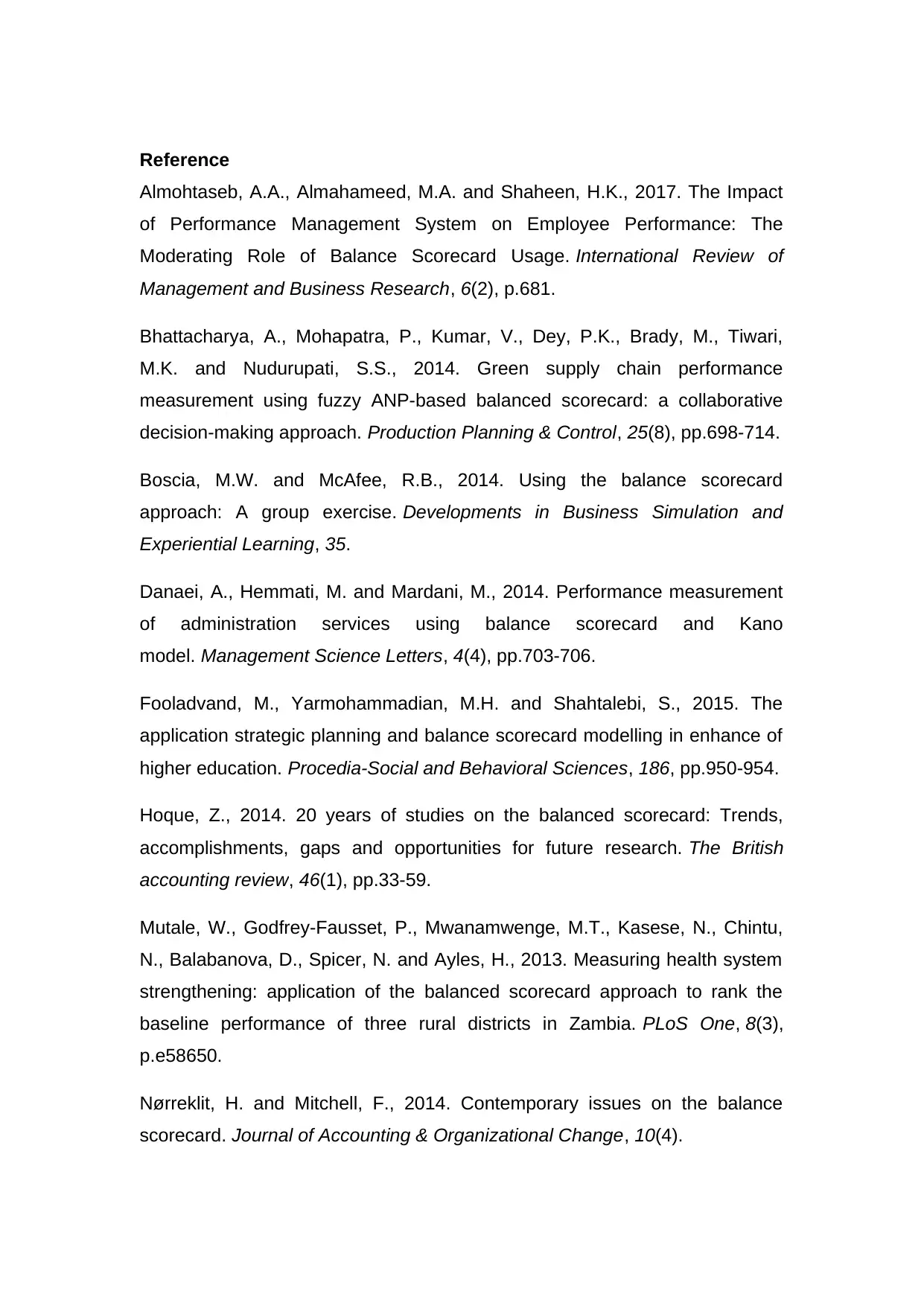
Reference
Almohtaseb, A.A., Almahameed, M.A. and Shaheen, H.K., 2017. The Impact
of Performance Management System on Employee Performance: The
Moderating Role of Balance Scorecard Usage. International Review of
Management and Business Research, 6(2), p.681.
Bhattacharya, A., Mohapatra, P., Kumar, V., Dey, P.K., Brady, M., Tiwari,
M.K. and Nudurupati, S.S., 2014. Green supply chain performance
measurement using fuzzy ANP-based balanced scorecard: a collaborative
decision-making approach. Production Planning & Control, 25(8), pp.698-714.
Boscia, M.W. and McAfee, R.B., 2014. Using the balance scorecard
approach: A group exercise. Developments in Business Simulation and
Experiential Learning, 35.
Danaei, A., Hemmati, M. and Mardani, M., 2014. Performance measurement
of administration services using balance scorecard and Kano
model. Management Science Letters, 4(4), pp.703-706.
Fooladvand, M., Yarmohammadian, M.H. and Shahtalebi, S., 2015. The
application strategic planning and balance scorecard modelling in enhance of
higher education. Procedia-Social and Behavioral Sciences, 186, pp.950-954.
Hoque, Z., 2014. 20 years of studies on the balanced scorecard: Trends,
accomplishments, gaps and opportunities for future research. The British
accounting review, 46(1), pp.33-59.
Mutale, W., Godfrey-Fausset, P., Mwanamwenge, M.T., Kasese, N., Chintu,
N., Balabanova, D., Spicer, N. and Ayles, H., 2013. Measuring health system
strengthening: application of the balanced scorecard approach to rank the
baseline performance of three rural districts in Zambia. PLoS One, 8(3),
p.e58650.
Nørreklit, H. and Mitchell, F., 2014. Contemporary issues on the balance
scorecard. Journal of Accounting & Organizational Change, 10(4).
Almohtaseb, A.A., Almahameed, M.A. and Shaheen, H.K., 2017. The Impact
of Performance Management System on Employee Performance: The
Moderating Role of Balance Scorecard Usage. International Review of
Management and Business Research, 6(2), p.681.
Bhattacharya, A., Mohapatra, P., Kumar, V., Dey, P.K., Brady, M., Tiwari,
M.K. and Nudurupati, S.S., 2014. Green supply chain performance
measurement using fuzzy ANP-based balanced scorecard: a collaborative
decision-making approach. Production Planning & Control, 25(8), pp.698-714.
Boscia, M.W. and McAfee, R.B., 2014. Using the balance scorecard
approach: A group exercise. Developments in Business Simulation and
Experiential Learning, 35.
Danaei, A., Hemmati, M. and Mardani, M., 2014. Performance measurement
of administration services using balance scorecard and Kano
model. Management Science Letters, 4(4), pp.703-706.
Fooladvand, M., Yarmohammadian, M.H. and Shahtalebi, S., 2015. The
application strategic planning and balance scorecard modelling in enhance of
higher education. Procedia-Social and Behavioral Sciences, 186, pp.950-954.
Hoque, Z., 2014. 20 years of studies on the balanced scorecard: Trends,
accomplishments, gaps and opportunities for future research. The British
accounting review, 46(1), pp.33-59.
Mutale, W., Godfrey-Fausset, P., Mwanamwenge, M.T., Kasese, N., Chintu,
N., Balabanova, D., Spicer, N. and Ayles, H., 2013. Measuring health system
strengthening: application of the balanced scorecard approach to rank the
baseline performance of three rural districts in Zambia. PLoS One, 8(3),
p.e58650.
Nørreklit, H. and Mitchell, F., 2014. Contemporary issues on the balance
scorecard. Journal of Accounting & Organizational Change, 10(4).
Paraphrase This Document
Need a fresh take? Get an instant paraphrase of this document with our AI Paraphraser
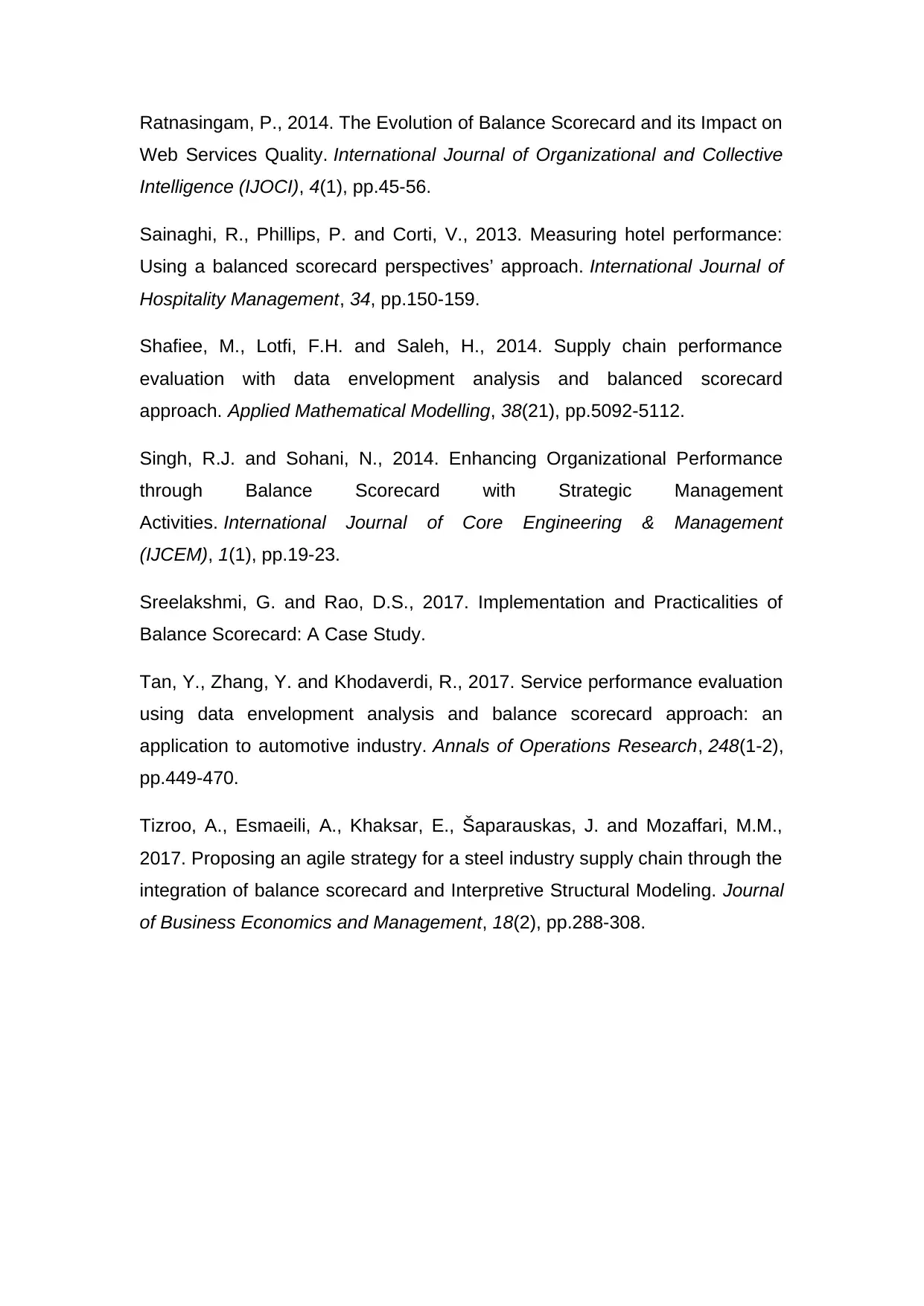
Ratnasingam, P., 2014. The Evolution of Balance Scorecard and its Impact on
Web Services Quality. International Journal of Organizational and Collective
Intelligence (IJOCI), 4(1), pp.45-56.
Sainaghi, R., Phillips, P. and Corti, V., 2013. Measuring hotel performance:
Using a balanced scorecard perspectives’ approach. International Journal of
Hospitality Management, 34, pp.150-159.
Shafiee, M., Lotfi, F.H. and Saleh, H., 2014. Supply chain performance
evaluation with data envelopment analysis and balanced scorecard
approach. Applied Mathematical Modelling, 38(21), pp.5092-5112.
Singh, R.J. and Sohani, N., 2014. Enhancing Organizational Performance
through Balance Scorecard with Strategic Management
Activities. International Journal of Core Engineering & Management
(IJCEM), 1(1), pp.19-23.
Sreelakshmi, G. and Rao, D.S., 2017. Implementation and Practicalities of
Balance Scorecard: A Case Study.
Tan, Y., Zhang, Y. and Khodaverdi, R., 2017. Service performance evaluation
using data envelopment analysis and balance scorecard approach: an
application to automotive industry. Annals of Operations Research, 248(1-2),
pp.449-470.
Tizroo, A., Esmaeili, A., Khaksar, E., Šaparauskas, J. and Mozaffari, M.M.,
2017. Proposing an agile strategy for a steel industry supply chain through the
integration of balance scorecard and Interpretive Structural Modeling. Journal
of Business Economics and Management, 18(2), pp.288-308.
Web Services Quality. International Journal of Organizational and Collective
Intelligence (IJOCI), 4(1), pp.45-56.
Sainaghi, R., Phillips, P. and Corti, V., 2013. Measuring hotel performance:
Using a balanced scorecard perspectives’ approach. International Journal of
Hospitality Management, 34, pp.150-159.
Shafiee, M., Lotfi, F.H. and Saleh, H., 2014. Supply chain performance
evaluation with data envelopment analysis and balanced scorecard
approach. Applied Mathematical Modelling, 38(21), pp.5092-5112.
Singh, R.J. and Sohani, N., 2014. Enhancing Organizational Performance
through Balance Scorecard with Strategic Management
Activities. International Journal of Core Engineering & Management
(IJCEM), 1(1), pp.19-23.
Sreelakshmi, G. and Rao, D.S., 2017. Implementation and Practicalities of
Balance Scorecard: A Case Study.
Tan, Y., Zhang, Y. and Khodaverdi, R., 2017. Service performance evaluation
using data envelopment analysis and balance scorecard approach: an
application to automotive industry. Annals of Operations Research, 248(1-2),
pp.449-470.
Tizroo, A., Esmaeili, A., Khaksar, E., Šaparauskas, J. and Mozaffari, M.M.,
2017. Proposing an agile strategy for a steel industry supply chain through the
integration of balance scorecard and Interpretive Structural Modeling. Journal
of Business Economics and Management, 18(2), pp.288-308.
1 out of 8
Related Documents
Your All-in-One AI-Powered Toolkit for Academic Success.
+13062052269
info@desklib.com
Available 24*7 on WhatsApp / Email
![[object Object]](/_next/static/media/star-bottom.7253800d.svg)
Unlock your academic potential
© 2024 | Zucol Services PVT LTD | All rights reserved.





